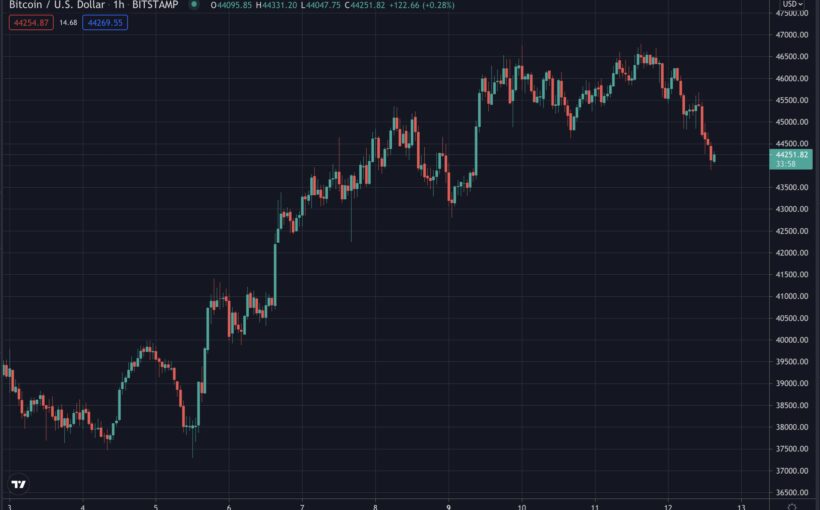Bitcoin has fallen a bit from $46,800 to $44,200 with it unclear whether the currency is just taking a pit stop in a bull run or otherwise.
It has risen for much of this month, in part fueled by ethereum which has burned 32,814 eth as of writing, worth more than $100 million.
In part it rose because it tried breaking support at $28,000 numerous times and failed, with Elon Musk’s revelation that SpaceX bought bitcoin contributing towards an upturn.
More recently the words mining, staking and crypto going into the Congressional record, with the battle to continue at the House, added some bullishness.
“We don’t need another backroom deal between Gensler and Elizabeth Warren,” said Patrick McHenry, the ranking Republican on the House Financial Services Committee, after adding:
“Chairman Gensler’s latest move to ask Congress for jurisdiction over non-securities exchanges is a blatant power grab that will hurt American innovation.
Given the distinct nature of digital assets, policymakers must be thoughtful and deliberative in legislating in this space.
That’s why I introduced H.R. 1602, the Eliminate Barriers to Innovation Act, to bring regulatory certainty to market participants and regulators. We need smart policy, made through a transparent process, to ensure innovation and job creation continue in the US.”
The Securities and Exchanges Commission (SEC) chairman Gary Gensler is seemingly ignoring a lot of shenanigans going on in traditional finance in regards to naked short selling which during the peak of the GME saga threatened clearing houses.
Instead he is focusing on how to get more money from taxpayers to go against cryptos by asking Congress for jurisdiction over decentralized finance.
“The problem is that there is no consistency of approach or vision among states over legal and regulatory matters. Most crypto assets and currencies are intended to be used worldwide, so disagreements between legal and regulatory systems give rise to the possibility of conflicting rules being applicable,” says Barnabas Reynolds, a partner at Shearman & Sterling LLP, in an editorial for the Telegraph.
Some might take that as London’s attempt to hint they could provide some jurisdictional competition, but bigger eyes might be on Amsterdam or Frankfurt. Europe has said nothing so far, perhaps because why on earth stop your competitor in the middle of making a mistake.
Yet there’s a powerful narration which can be sold to Europeans. A crypto focused continent wide SEC upon which then a continent wide financial regulator can be built to address significant inefficiencies in Europe and so turbocharge the economy.
US arrogance therefore can be very costly, with a mistake here just the opening shot in a race of financial competition as the digerati play the dance of jurisdictions with India potentially a new player as well, leaving only the question of whether the enforcement of any jurisdiction’s law over entities based outside their jurisdiction solely because they happen to have US customers as well, amounts to protectionism and effective occupation.
Giving a new prism to Biden’s proposed summit of democracies which some might call the empire’s occupation if the United States so ignorantly acts so arrogantly to dictate even over individuals and entities that are not based in the United States.
Apt timing thus the hack of some cross-chain platform, the Poly Network, based on the exploit of a slip regarding permission rights with the coders limiting permission to an asset holding contract, but not to another one that owns that contract and can change who has permission.
As it happens the hacker is returning the assets now, some speculate because he was caught using a centralized exchange which may identify him, but corporate media has already reported the biggest hack in history, even though the hacker has now returned $450 million worth of $600 million assets, with Bloomberg in particular very keen to ree at cryptos at any opportunity that arises, and only ree.
That’s presumably because the Bloomberg Terminal is useless where cryptos are concerned with all data open sourced in this blockchain space, rather than hidden behind $10,000 a year paywalls.
Yet the crypto coolness continues. Lionel Messi will now be paid in a crypto fan token part of his circa €30 million signing on fee at Paris St Germain. It’s not clear just how much of it is crypto, except that it’s a “significant sum.”
Sport appears to be rising as a pioneer of crypto adoption with Bitgo having a nice page detailing the many crypto athletes as the caravan moves on.
And is joined by Neuberger Berman, an employee-owned investment management firm with some $400 billion in assets under management, which has filed for a bitcoin mutual fund.
A small development in the grand scheme of things, but it is a bit surprising jut how many of these small developments are currently unfolding and in more meaningful ways.
As an example, the brokerage arm of the DBS Bank, DBS Vickers, has received in-principle approval from the Monetary Authority of Singapore to offer crypto trading.
Numerous such announcements paint a clear trend of infrastructure integration with it to go the other way as well as Circle is to become a bank.
That’s while defi goes outside the banking system to provide direct peer to peer finance, with crypto 2021 being at that sweet age of late childhood before the teenage years in the next cycle.
Source: Read Full Article
